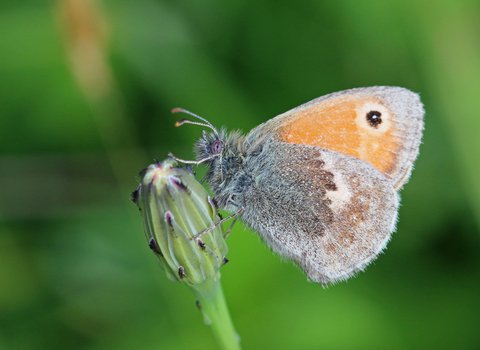
Small heath ©Wendy Carter
Small heath
The small heath is the smallest of our brown butterflies and has a fluttering flight. It favours heathlands, as its name suggests, as well as other sunny habitats.
Scientific name
Coenonympha pamphilusWhen to see
April to SeptemberSpecies information
Category
Statistics
Wingspan: 3.3-3.7cmPriority Species under the UK Post-2010 Biodiversity Framework.
About
The small heath is a small, inconspicuous butterfly of heathland, moorland, grassland and coastal habitats. Adults are on the wing from April to September in some places, and appear in two or three broods. They only fly in sunny conditions, always settling close to the ground. Caterpillars feed on a variety of grasses such as fescues and meadow-grasses.How to identify
The small heath is a small, light orange butterfly, with one eyespot on each forewing. The underside of its hindwings is browny-grey in colour and it always rests with its wings closed.Distribution
Widespread, but not common.Did you know?
The closely related large heath is a butterfly of boggy moorland. It has suffered serious declines, so is also a priority species and protected under the Countryside and Wildlife Act, 1981.Watch
Small heath (https://vimeo.com/478439127)
Small heath ©Tom Hibbert
